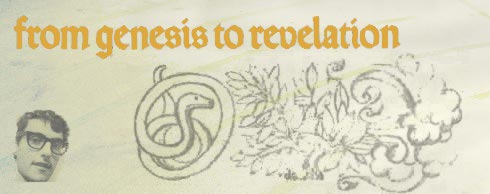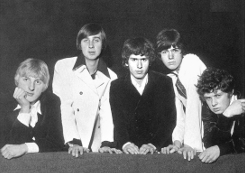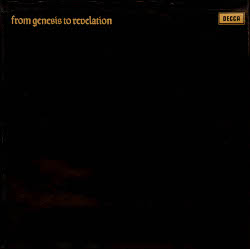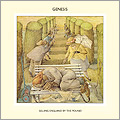


Genesis‘ first album was not called Trespass but From Genesis To Revelation. Many fans tend to count it as their zeroeth album. It shows no or at best only the most minuscule traces of the style that would make them well-known later, and therefore frequently meets with a refusal and lack of affection. Justly so?
The band did not have the line-up they got known with yet. One could say they did not even exist. They came together to record demo-tapes in the first place. All of them knew each other from Charterhouse public school. The songwriter team Rutherford and Anthony Phillips asked Tony Banks to play the piano for them; Banks only agreed if he could bring his songwriting partner Peter Gabriel to record a song. Soon they were convinced that Gabriel’s voice sounded better than Phillips’ so he ended up singing on all the songs.
When he did not sing, Phillips played the guitar, a position he would retain up to Trespass. Initially, the drums were played by one Chris Stewart, though the drumming on the album would be done by John Silver. The drummer’s stool would not be filled permanently until Phil Collins joined Genesis. Only with him did the band find someone who was accepted as a full member and could incorporate himself.
These boys (most of them were around 17 at the time) managed to land a record contract with Jonjo Music in August 1967. That only meant that a single would be released. King was an alumnus of Charterhouse and had had quite a successful hit with Everyone’s Gone To The Moon. A shallow pop song though that may have been, he nevertheless seemed to be a person of success and influence, and they found it very promising that they could have him produce them.
 They recorded two singles with King that came out in February and May 1968. Both did just well enough that Kind decided to record a full album with the band during the summer holidays. This was quite an unusual move. Rock music was quite a young business then that was run by young people and rather looked down upon by others in the world of music. Rock was new territory, with infinite space to explore, try out and invent things – in music as well as business. Radio stations were important means of distribution – for in those times you could not read as much about pop music in a whole year as you now can in one day (as Tony Banks put it).
They recorded two singles with King that came out in February and May 1968. Both did just well enough that Kind decided to record a full album with the band during the summer holidays. This was quite an unusual move. Rock music was quite a young business then that was run by young people and rather looked down upon by others in the world of music. Rock was new territory, with infinite space to explore, try out and invent things – in music as well as business. Radio stations were important means of distribution – for in those times you could not read as much about pop music in a whole year as you now can in one day (as Tony Banks put it).
The band were keen to into this business. In order to please Jonathan King, who liked it simple, they wrote a song in the style of the Bee Gees, Silent Sun. King liked it and made it the first of the two singles. The band were developing in another direction, though. Their music was more and more determined by long, meandering passages, a style they would develop and extend later on. Besides the usual guitars it was Tony Banks’ organ playing that left its mark; according to Anthony Phillips, Banks was the most accomplished of the instrumentalists). None of this can be heard on From Genesis To Revelation, though.
Jonathan King christened the band Genesis. He found it a fitting name for a new creation that would make the beginning of his career as a serious producer. He attempted to drive them in a same direction as the singles that had been gentle and acoustic. For one thing, he felt that there was a niche for them, and for another, such music did not require a large number of instruments the band could not afford. Another reason was the aim for mass-compatibility in easy listening. Not only did he try to steer the band away from all the “organ nonsense”, but he also had the idea to tell a story in the album, the story from Genesis to Revelation. (Which also means that The Lamb was not the band’s first concept album).
Did that idea come from the band name, or vice versa? Who knows. It turned out that there was an American band called Genesis, too. On short notice the band name was dropped from the cover so that it only had the album title in old-fashioned Gothic print. It is said that this caused record stores to place the album in the corner for religious music which in turn would have contributed to the meager sales. But that may be a pious legend…
As with the Silent Sun single, string arrangements were added to the recorded songs. It was a fait accompli for the band who only found out when the album was released. They had accepted the strings for the single, but this time Anthony Phillips found them terrible, disfiguring, overly sweet and not at all corresponding to the simple and straight approach of the band. The fourth CD on Archive I 1967-1975 contains several songs from the album without the strings (“FGTR naked”, as it were). From them one gets a good impression of what was originally intended.
One of the problems in discussing the album is the fact that it has been (re-)released several times over on vinyl and CD with varying track lists.

Usually, the singles or other songs augmented the songs from the original version. This review shall concern itself with the original track list.
The songs are quite simple. The leading instruments are piano, guitar and vocals, plus the strings. The overall sound of the album is undemonstrative. There are no banging drums, not overpowering electric guitars, none of the aggression that surfaces in The Knife; everything is lovely and peaceful. – A hippie album?
The lyrics are quite simple. At times they are full of pseudo-sophisticated mock social criticism with imagery that tries to be poetic. The first half of the album actually does sort of follow the creation as described in the Bible. In The Beginning does not go far beyond a longer rephrasing of DIE ERDE WAR WÜST UND LEER. Fireside Song outlines something like “on the first morning the world was peaceful and beautiful”, and The Serpent describes man as innocent and free of sin right after the creation.
The second half of the album moves to more general topics. There is talk of aggressive rich conquerors, of limbo, but also of windows out of the confusion. Love is declared in One Day and of course also in Silent Sun. It all ends with the presentation that the devil is dead and one has finally found a place to call one’s own.
Musically, the songs stick to the conventional pattern of verse and chorus. There are several unconnected interludes between the rather short songs in which some of the tunes are reprised. What is remarkable is the fact that electric guitars are only used to characterize something as evil. Apart from the strings (that are not used for every song) there are also a brass group and a solo trumpet. They all give the album a gentle feel.
At the time the album was recorded the band were not tuned into each other, in fact they had hardly managed their instruments. Some of the flaws can be heard on the album, e.g. a bum note in the Window intro. Gabriel forces his voice up for In The Wilderness almost beyond his possibilities. The flute he plays on Am I Very Wrong is barely not off-key, but the whole song seems constantly on the brink of collapsing. The whole production is amateurish. The fade-out in A Place To Call My Own is extremely sudden – probably owing to the lack of space on the LP.
Some of the songs still capture the listener’s attention. Where The Sour Turns To Sweet right at the beginning has acceptable lyrics alongside a mysterious quiet tune penned by Banks and Gabriel that can muster some energy in the chorus. The harsh sounds of In The Beginning make one listen twice, too. The Serpent, the original of which was called She Is Beautiful tries to sound like the Rolling Stones. In The Wilderness is, at its core, an interesting composition that is absolutely drowned in violins. One Day sounds like the good old Beatles, and Silent Sun aims at an hymnic attitude that is actually really touching. There are good moments on the record, but if you use later Genesis qualities as a standard you will be disappointed. The songs run their course without causing much excitement, and there are hardly any artistic detours.
It should be mentioned that there also is a mono version of the album, which is an independent mix (so not just a 2 into 1 mix of the stereo version). What is most remarkable about the mono version is that it has almost no echo effect on the vocals and the string and brass groups do not come so far to the fore. Several songs are a few seconds longer or shorter. The overall artistic impression is not affected.
It was only after the release of the album that the band began to play shows and really become a tight formation. Genesis split from Jonathan King as a producer after their contract, which had been shortened to one year, had run out. Praise to the parents of the band members, because they insisted on reducing the runtime of the contract from five years to twelve months. Jonathan King certainly meant well, but he was the wrong person for what the band were going to do. Still: He did send Genesis on their way and gave the band a start that was not too easy, as some of them felt in retrospect. He prompted them to fight for their music and to look for the right partners. Soon after they met Tony Stratton-Smith who enabled them to properly start their career with another album, Trespass.
by Thomas Schrage
English by Martin Klinkhardt



The 1973 Classic, remastered on CD in 2008.
Review available